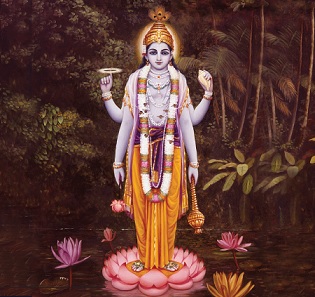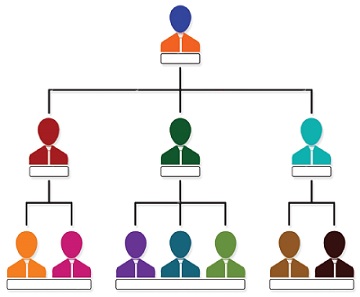
The Purpose of Following All Traditional Systems Lord
bhavatity anususruma
Human beings raise families, and they follow kula-dharma, or family rituals. Catur-varnyam maya srstam guna-karma-vibhagasah (Gita 4.13). This is meant for the human being (manusyanam), not for the animals. Without accepting the principles of varnasramadharma, which is ordained by Krishna , the Supreme Lord, we are not considered a human being. We are as good as animals because there is no regular, systematic principles that tell us how to live like a human being.
While conversing with Ramananda Raya, Caitanya Mahaprabhu talked of sadhyasadhana (Cc. Madhya 8.118). Sadhya means the goal of life, and sadhana means the activity by which we can attain the goal. As human beings, we should understand the goal of life and the means to attain it.
Personal Opinions Carry No Value
All of us in the material world are struggling to achieve happiness. So Sri Caitanya Mahaprabhu raised this question, “What is the goal of life?” Unless there is goal of life, a sadhya, there will be struggle. So Ramananda Raya answered the question by quoting an appropriate verse from the scriptures.
Nowadays it has become a fashion to project one’s own opinion: “In my opinion,” “I think in this way.” Everyone is falsely proud of one’s knowledge, even if he is a nonsense number one. What is the value such opinions?
The Vedic principle is that you don’t depend on your personal opinions; you quote an authority. Prakasananda Sarasvati, a great scholar, said to Lord Caitanya, “You are a sannyasi. You do not engage Yourself in the study of Vedanta. You are simply chanting Hare Krishna , Hare Krishna like a sentimental person.” Caitanya Mahaprabhu replied, “Yes, My Guru Maharaja, spiritual master, considered me a fool number one. He said I should just chant the holy names of Krishna .” Prakasananda Sarasvati knew that Lord Caitanya was a great learned scholar in His student life; he knew that the Lord was not a fool. So this is the way – you don’t consider you are very learned; you always present yourself as a fool.

In front of the spiritual master, one should be humble and submissive and should not be too eager to display our knowledge
Krishna dasa Kaviraja Gosvami, the author of Caitanya-caritamrta too presents himself in a similar way. He says (Cc. adi 5.205), jagai madhai haite muni se papistha/ purisera kita haite muni se laghistha: “I am more sinful than Jagai and Madhai and even lower than the worms in the stool.” This is the right mood; nobody should think of oneself as a big man worthy of giving great opinions: “Now I have learned everything. I can surpass everyone. I have become above all rules and regulation. Now I have become paramahamsa.” This is rascaldom. One should humbly think, “What is my value?” That is the sign of a learned person. When we work with such a mood our endeavors will attain success. Otherwise your spiritual regulative principles will break and you will fall down.
Arjuna is adopting a similar mood here. “Krishna , I have heard it from authoritative sources.” He doesn’t say, “Krishna , in my opinion, if it is done like that, then people will go to hell.” He says iti anususruma: “Thus I have heard from authoritative sources.” This is called parampara system.
Various Levels of Authority
Quoting from Vedic authority, Ramananda Raya answered Lord Caitanya’s question by saying, “The real purpose of life, the goal of life, is to satisfy the Supreme Personality of Godhead.” For example, as citizens of a country, our duty is to follow the government’s authority and serve the government. When one renders exceptional service, one gets recognized by the government and may be awarded respectable titles and positions. So if this is the system in our ordinary life, then the aim of life should be to satisfy the supreme governor, or supreme government. This is common sense.

Just as there are different levels of authority in a corporate organization, so a similar heirarchy exists in the structure of universal management
But today no one acknowledges the supreme government. They think, “Whatever government we make, that is final.” There are so many kingdoms, so many planets. In each planet there is government, an authority, and above all of them, there is the supreme authority, Krishna . isvarah paramah Krishna h sac-cid-anandavigrahah (Brahma-samhita 5.1). This is the sastric injunction.
Lord Brahma is the controller of this whole universe. In an office, there are several departmental heads, above all of whom there could be a managing director. Several directors are working under another boss, and so on . . . A similar system applies to the universal creation. Brahma is the manager of one brahmanda, universe. And there are millions and trillions of Brahmas (jagadanda- kotih). Krishna is the supreme proprietor, sarvaloka- mahesvaram (Gita 5.29), and He has got many secretaries and assistants.
Citizens and Outlaws in the Universal Government
So anyway, in this small government, our business is to satisfy the governor. Suppose you decry the British queen publicly by saying “The Queen is a prostitute.” What will happen? You will be immediately arrested and punished. In your private house you may say whatever you want, and nobody will hear. But if you speak such nonsense in public, you will be seen as a criminal.
What is the difference between good citizens and outlaws? A good citizen is always trying to satisfy the government by abiding the laws given by the government. Similarly our ultimate goal should be to satisfy the supreme government, Krishna , because Krishna is the supreme. Visnur aradhyate pantha nanyat tat-tosakaranam (Visnu Purana 3.8.9). Therefore our business is to satisfy Krishna , to become perfect. These are common-sense affairs. Na te viduh svartha-gatim hi visnum (Bhagavatam 7.5.31). Why don’t the people understand?
So this is Vaisnavism. One who wants to satisfy Visnu is called a Vaisnava. Visnu is the Supreme Lord, so everything is arranged to satisfy the Lord Visnu. Cats and dogs cannot be trained up to satisfy Visnu; they are simply busy with four principles of life: eating, sleeping, sex-life and defending. That’s all. They cannot be trained to think “Man-mana bhava madbhakto mad yaji mam namaskuru (Gita 18.65): You become a devotee of Krishna .” No, that is not possible. Therefore in this verse we see the word manusyanam. Satisfying Krishna is the duty of the manusya, not of the dog.
Defining the Ultimate Goal – Serving Lord Visnu
Human life has got a great responsibility. If you become like cats and dog, the hippies, then everything is destroyed. They have no family. They don’t care for any rules and regulation. Utsanna, everything destroyed. Jaghanya-guna-vrtti-sthah (Gita 14.18). No family life, no taking bath, no worship – an irresponsible lifestyle. We see such things nowadays. What was spoken by Arjuna five thousand years ago is now happening. Therefore a human being should understand his position and satisfy the Supreme Lord. This is the whole plan.
A Vaisnava is already a brahmana. To become brahmana is not enough. We see in the Caitanya-caritamrta that Srila Madhavendra Puri, while installing his Deity of Gopala, initiated many caste brahmanas to become Vaisnavas. Without becoming a Vaisnava, nobody has the right to worship Visnu. Visnu will not accept anything from anyone unless he is devotee. He agrees to accept our offering just on the basis of love. The Vaisnava loves Visnu, and Visnu agrees to accept any foodstuff. Patram puspam phalam toyam yo me bhaktya prayacchati (Gita 9.26). Bhakti is the main thing, not your palatable dish. Visnu is quite competent to prepare thousand times better palatable dishes than you can offer. But the real thing he is looking for is bhakti.
Visnur aradhana means one must become a Vaisnava, and Vaisnava means regulated life, not a spoiled life where everything is destroyed, to become hogs. Our aim is to satisfy the Supreme Lord, and this can be done perfectly if we follow the regulative principles of jatidharma, kula-dharma, the occupational duties of your social order. Just like in your country, England, the Lord family [royal family of the Queen] is maintained. The Lord family has got money deposited with the government, and the government gives the interest so that the family tradition may be maintained, the aristocratic style. But if they spoil the traditions, the government will not care for them anymore. Then their house will be sold and they will become street-beggars. That’s all – no more Lord family.
So if you want to make your life successful, you must keep the tradition of brahmana-vaisnava. As Vaisnavas, our only tradition is to satisfy Visnu. Actually that is the tradition of everyone, but especially of the Vaisnavas. They must be very alert, very careful, how to keep Lord Visnu or Krishna satisfied; that is our only business. When you have invited Visnu, Krishna , Caitanya Mahaprabhu, to accept your service, you must be very careful how to render service. If you neglect it, then utsanna-kula-dharmanam, you will spoil everything. Actually, human life begins when he is ready to serve the Supreme Lord Visnu. That is human life; otherwise it is animal life.
